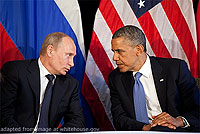US-Russia Relations in Holding Pattern

(Voice of America – Andre de Nesnera – November 21, 2012)
Relations between the United States and Russia are at the moment on the back burner, given the current crisis in the Middle East. VOA looks at the state of relations between Washington and Moscow as President Barack Obama prepares for his second term in office.
Obama has made better relations with Moscow a cornerstone of his foreign policy. During the last four years, the so-called “reset” in relations brought about a major arms control agreement and increased cooperation on such issues as Afghanistan and Iran.
At the same time, analysts say some major differences remain such as how to approach the crisis in Syria and how to resolve the question of the missile defense shield championed by the Obama administration.
Stephen Jones, a Russia expert at Mount Holyoke College in Massachusetts, says there is a sense of relief in Moscow government circles that Obama was re-elected president.
“It seems that Obama was the president of choice for Russia and they feel that they can work with him,” said Jones. “They are used to the man by now and it’s easier for them to deal with somebody they know than the devil that they don’t know.”
Robert Legvold of Columbia University in New York City and other analysts say they do not believe Russian President Vladimir Putin wanted Mitt Romney, a man who described Russia as Washington’s “number one geopolitical foe,” to be elected U.S. president.
“There are some on the Russian side who are a little more cynical about these things, who argue that a harder-line U.S. president would actually have served his purpose, because it would have enlarged the ‘enemy image’ that he uses to justify both domestic policy and some of the things that he does in foreign policy,” said Legvold. “But I think that is a misreading of him.”
Legvold says continuity in U.S. policy toward Moscow is very important for Russian officials.
“Because at this point, the Russians are looking for as much predictability in their external environment as they can find, as they wrestle with domestic problems,” said Legvold. “And since there is a great deal of uncertainty in some parts of the world, beginning with the Islamic south and everything to the south of the former Soviet Union, continuity in key relationships with the U.S., with China and the like – the European Union – that’s very important to them.”
Looking ahead, some analysts ask whether the United States will exert as much energy to its relationship with Russia as it did during Obama’s first term.
Stephen Jones from Mount Holyoke College said, “The United States, at the moment, is more focused, obviously on what is happening in the Middle East, in North Africa.[There is] the attention also to China. These are the issues, more than Russia, that are sort of distracting the United States, I guess, or focusing the attention of the United States.”
For his part, Legvold describes the state of the U.S.-Russia relationship as “unpredictable.”
“If things are going to go well, and I believe they could, it’s going to require attention and initiative,” said Legvold. “And failing that, the relationship really could get bounced or buffeted by the unexpected event.”
Analysts believe one thing is for sure: the U.S.-Russia relationship has grown over the years to such an extent, that they say a return to the tension-filled Cold War days is virtually impossible.
